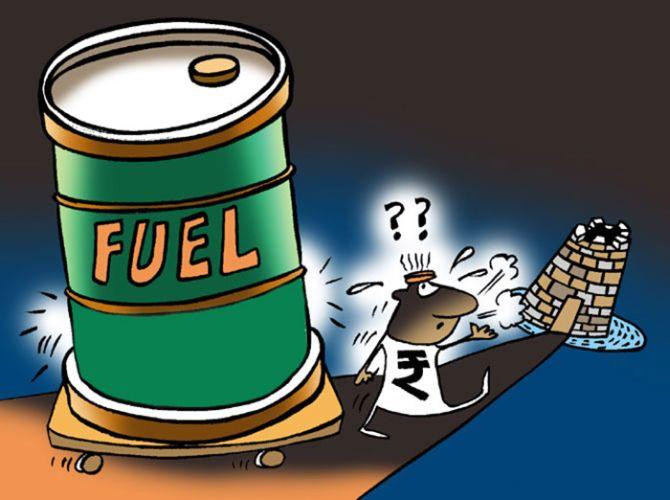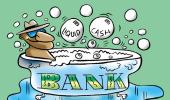India's top fuel retailers IOC, BPCL and HPCL together lost around $2.25 billion (Rs 19,000 crore) in revenue for keeping petrol and diesel prices on hold during elections in five states, including Uttar Pradesh, Moody's Investors Services said on Thursday.

State fuel retailers did not revise petrol and diesel rates for a record 137 days despite prices of crude oil (raw material for producing fuel) rising to $120 per barrel compared to around $82 in early November when the hiatus began.
"Based on current market prices, the oil marketing companies are currently incurring a revenue loss of around $25 (over Rs 1,900) per barrel and $24 per barrel on sale of petrol and diesel, respectively," Moody's said in a report.
If crude oil prices continue to average around $111 a barrel, the three rated entities - IOC, BPCL and HPCL - will incur a combined daily loss of around $65-70 million on the sale of petrol and diesel unless fuel prices are increased to cover the rising crude oil prices, it said.
"Based on our estimates of average sales volume between November and first three weeks of March, the state-owned refining and marketing companies together have lost around $2.25 billion in revenue on petrol and diesel sales," Moody's said.
This equates to around 20 per cent of the combined FY2021 EBITDA for the three entities.
State-owned Indian Oil Corporation (IOC), Bharat Petroleum Corporation and Hindustan Petroleum Corporation (HPCL) on March 22 and 23 raised petrol and diesel prices by 80 paise per litre each but paused the increase on Thursday.
Oil companies "will need to raise diesel prices by Rs 13.1-24.9 per litre and Rs 10.6-22.3 a litre on gasoline (petrol) at an underlying crude price of $100-120 per barrel," according to Kotak Institutional Equities.
CRISIL Research said a Rs 9-12 per litre increase in retail will be required for a full pass-through of an average $100 per barrel crude oil and Rs 15-20 a litre if the average crude oil price rises to $110-120.
Moody's estimated that IOC's revenue loss was around $1-1.1 billion while that of BPCL and HPCL was about $550-650 million each for the period between November and March.
"This loss in revenue will add to the short term borrowings, funded with working capital lines, of the refiners until such time that crude oil prices stay at elevated levels.
"Over time, the companies might be able to make up for some of these losses if oil prices come down," it added.
While fuel prices in India are deregulated and the refiners can pass on cost increases to the consumer, a steep price hike such as the one required under the current oil price environment will be in coordination with the government and may involve a reduction in excise duties.
"We do expect that the government will allow the refiners to adjust prices appropriately and avoid a situation where refiners continue to make losses of this magnitude for a prolonged period," it said.
Commenting on the two days of price increase, Moody's said this underpins the expectation that the price increases will be gradual and occur over a period of time rather than being a one-time adjustment.
"Until such time, the refining and marketing companies can cover the increase in feedstock costs either by an increase in selling prices or a reduction in excise duties or both, they will have to continue to absorb a proportion of the increased feedstock costs which will hurt their profitability and increase borrowings," it said.
A sustained increase in crude oil prices will also result in inventory valuation gains for the refiners, which will partially mitigate the impact of lower selling prices.
Higher crude oil prices will also result in increased working capital requirements, resulting in incremental borrowings for the refiners.
Weaker earnings combined with higher borrowings will weaken the credit metrics of the downstream companies, the rating agency said.
"A sharp rise in crude oil prices, combined with the refiners' inability to increase retail selling prices of transportation fuels in India for over four months (between November 4, 2021, and March 21, 2022) due to recently concluded elections in five Indian states, will hurt the profitability of state-owned refining and marketing companies IOC, BPCL and HPCL," it said.
High oil prices, however, will have a mixed impact on the sector.
While upstream oil and gas producers such as ONGC and OIL will benefit from higher earnings, downstream companies like IOC, BPCL and HPCL will be negatively impacted because of higher feedstock costs and increased working capital requirements.










